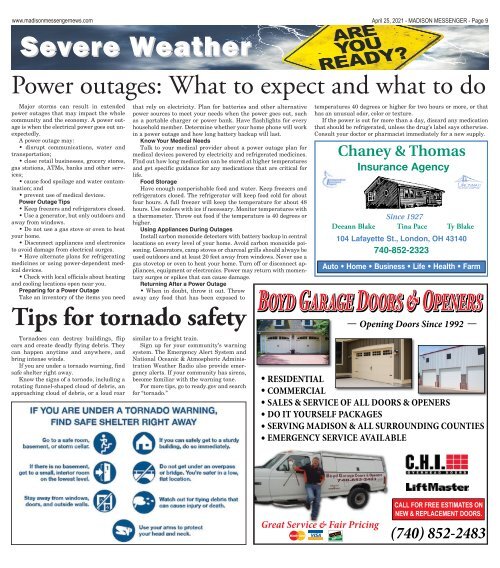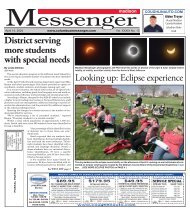You also want an ePaper? Increase the reach of your titles
YUMPU automatically turns print PDFs into web optimized ePapers that Google loves.
www.madisonmessengernews.com<br />
<strong>April</strong> 25, <strong>2021</strong> - MADISON MESSENGER - Page 9<br />
Severe Weather<br />
Power outages: What to expect and what to do<br />
Major storms can result in extended<br />
power outages that may impact the whole<br />
community and the economy. A power outage<br />
is when the electrical power goes out unexpectedly.<br />
A power outage may:<br />
• disrupt communications, water and<br />
transportation;<br />
• close retail businesses, grocery stores,<br />
gas stations, ATMs, banks and other services;<br />
• cause food spoilage and water contamination;<br />
and<br />
• prevent use of medical devices.<br />
Power Outage Tips<br />
• Keep freezers and refrigerators closed.<br />
• Use a generator, but only outdoors and<br />
away from windows.<br />
• Do not use a gas stove or oven to heat<br />
your home.<br />
• Disconnect appliances and electronics<br />
to avoid damage from electrical surges.<br />
• Have alternate plans for refrigerating<br />
medicines or using power-dependent medical<br />
devices.<br />
• Check with local officials about heating<br />
and cooling locations open near you.<br />
Preparing for a Power Outage<br />
Take an inventory of the items you need<br />
Tips for tornado safety<br />
that rely on electricity. Plan for batteries and other alternative<br />
power sources to meet your needs when the power goes out, such<br />
as a portable charger or power bank. Have flashlights for every<br />
household member. Determine whether your home phone will work<br />
in a power outage and how long battery backup will last.<br />
Know Your Medical Needs<br />
Talk to your medical provider about a power outage plan for<br />
medical devices powered by electricity and refrigerated medicines.<br />
Find out how long medication can be stored at higher temperatures<br />
and get specific guidance for any medications that are critical for<br />
life.<br />
Food Storage<br />
Have enough nonperishable food and water. Keep freezers and<br />
refrigerators closed. The refrigerator will keep food cold for about<br />
four hours. A full freezer will keep the temperature for about 48<br />
hours. Use coolers with ice if necessary. Monitor temperatures with<br />
a thermometer. Throw out food if the temperature is 40 degrees or<br />
higher.<br />
Using Appliances During Outages<br />
Install carbon monoxide detectors with battery backup in central<br />
locations on every level of your home. Avoid carbon monoxide poisoning.<br />
Generators, camp stoves or charcoal grills should always be<br />
used outdoors and at least 20 feet away from windows. Never use a<br />
gas stovetop or oven to heat your home. Turn off or disconnect appliances,<br />
equipment or electronics. Power may return with momentary<br />
surges or spikes that can cause damage.<br />
Returning After a Power Outage<br />
• When in doubt, throw it out. Throw<br />
away any food that has been exposed to<br />
temperatures 40 degrees or higher for two hours or more, or that<br />
has an unusual odor, color or texture.<br />
If the power is out for more than a day, discard any medication<br />
that should be refrigerated, unless the drug’s label says otherwise.<br />
Consult your doctor or pharmacist immediately for a new supply.<br />
Chaney & Thomas<br />
Insurance Agency<br />
Gloria Penwell Since 1927<br />
Tina Pace<br />
Deeann Deeann Blake Blake Tina Pace Ty Blake Ty Blake<br />
104 Lafayette St., London, OH 43140<br />
740-852-2323<br />
Auto • Home • Business • Life • Health • Farm<br />
BOYD GARAGE DOORS & OPENERS<br />
Opening Doors Since 1992<br />
Tornadoes can destroy buildings, flip<br />
cars and create deadly flying debris. They<br />
can happen anytime and anywhere, and<br />
bring intense winds.<br />
If you are under a tornado warning, find<br />
safe shelter right away.<br />
Know the signs of a tornado, including a<br />
rotating funnel-shaped cloud of debris, an<br />
approaching cloud of debris, or a loud roar<br />
similar to a freight train.<br />
Sign up for your community’s warning<br />
system. The Emergency Alert System and<br />
National Oceanic & Atmospheric Administration<br />
Weather Radio also provide emergency<br />
alerts. If your community has sirens,<br />
become familiar with the warning tone.<br />
For more tips, go to ready.gov and search<br />
for “tornado.”<br />
RESIDENTIAL<br />
COMMERCIAL<br />
SALES & SERVICE OF ALL DOORS & OPENERS<br />
DO IT YOURSELF PACKAGES<br />
SERVING MADISON & ALL SURROUNDING COUNTIES<br />
EMERGENCY SERVICE AVAILABLE<br />
Great Service & Fair Pricing<br />
CALL FOR FREE ESTIMATES ON<br />
NEW & REPLACEMENT DOORS.<br />
(740) 852-2483


















